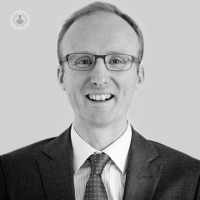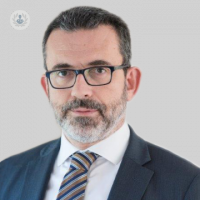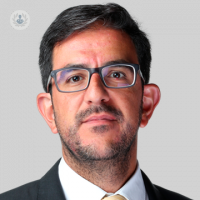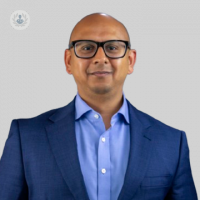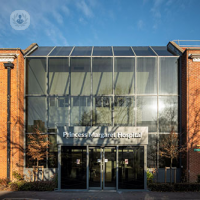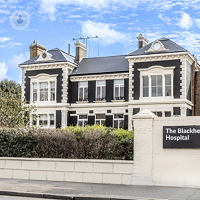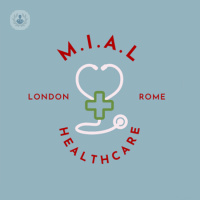What is cardiomyopathy?
Cardiomyopathy is disease of the heart muscle. It is something of an umbrella term for a number of conditions that affect this tissue. Cardiomyopathies may cause the walls of the heart chambers to become stiff, thickened, or stretched, which can put strain on the heart as it must work harder to pump blood around the body.
Types of cardiomyopathy
Types of cardiomyopathy include:
- Dilated cardiomyopathy (DCM)
- Hypertrophic cardiomyopathy (HCM)
- Arrhythmogenic right ventricular cardiomyopathy (ARVC)
- Restrictive cardiomyopathy (RCM)
- Left ventricular noncompaction (LVNC)
- Peripartum cardiomyopathy (PPCM)
- Takotsubo cardiomyopathy (broken heart syndrome)
Prognosis of cardiomyopathy
Most forms of cardiomyopathy have no cure. Cases of mild cardiomyopathy can usually be managed with lifestyle changes and monitoring the condition. More severe cases can lead to life-threatening complications without treatment to control the symptoms.
Takotsubo cardiomyopathy, on the other hand, is temporary and reversible if caught and treated in time. This can come on suddenly like a heart attack and must be dealt with immediately by the emergency services. It is unlikely to happen again to the same individual.
Symptoms of cardiomyopathy
Different cardiomyopathies affect the heart in different ways. Dilated cardiomyopathy can cause heart valve problems, an irregular heartbeat, blood clots, or heart failure, with associated symptoms of fatigue, shortness of breath, and swelling around the ankles. Hypertrophic cardiomyopathy, on the other hand, can lead to atrial fibrillation and mitral regurgitation, which can cause symptoms of dizziness, chest pain, shortness of breath and temporary loss of consciousness. Broken heart syndrome can feel a lot like a heart attack, with symptoms of chest pain and difficulty breathing.
Medical tests to diagnose cardiomyopathy
Tests such as echocardiograms and electrocardiograms (ECG) can help to diagnose cardiomyopathy. Inherited forms may also be diagnosed by genetic testing.
What are the causes of cardiomyopathy?
Dilated cardiomyopathy (DCM), hypertrophic cardiomyopathy (HCM), and arrhythmogenic right ventricular cardiomyopathy (ARVC) are most commonly inherited, often running in families. Restrictive cardiomyopathy can sometimes be inherited, but in many cases the cause is unknown.
Takotsubo cardiomyopathy is brought on by physical and/or emotional stress, with a sudden surge of adrenaline or hormones temporarily weakening the heart muscle.
Treatments for cardiomyopathy (include types – ASK DOCTORS)
Treatment for cardiomyopathy generally involves managing the symptoms and preventing complications. Lifestyle measures may include:
- Healthy diet
- Quit/avoid smoking
- Maintain a healthy weight
- Avoid/reduce alcohol intake
- Reduce stress
- Get enough sleep
The following medications may be recommended by the doctor:
- Blood pressure medication
- Beta-blockers for an irregular heartbeat or heart failure
- Diuretics – if the cardiomyopathy has caused swelling, these help remove fluid from the body.
- Anticoagulants, e.g. warfarin – these help prevent blood clots.
- Medication for heart failure
Some patients may require hospital procedures, including heart surgery or the fitting of a pacemaker. In particularly severe cases, a last resort could be a heart transplant.
Which type of specialist treats cardiomyopathy?
Cardiologists treat the various types of cardiomyopathy.
06-11-2019Miocardiopatía
What is cardiomyopathy?
Cardiomyopathy is disease of the heart muscle. It is something of an umbrella term for a number of conditions that affect this tissue. Cardiomyopathies may cause the walls of the heart chambers to become stiff, thickened, or stretched, which can put strain on the heart as it must work harder to pump blood around the body.
Types of cardiomyopathy
Types of cardiomyopathy include:
- Dilated cardiomyopathy (DCM)
- Hypertrophic cardiomyopathy (HCM)
- Arrhythmogenic right ventricular cardiomyopathy (ARVC)
- Restrictive cardiomyopathy (RCM)
- Left ventricular noncompaction (LVNC)
- Peripartum cardiomyopathy (PPCM)
- Takotsubo cardiomyopathy (broken heart syndrome)
Prognosis of cardiomyopathy
Most forms of cardiomyopathy have no cure. Cases of mild cardiomyopathy can usually be managed with lifestyle changes and monitoring the condition. More severe cases can lead to life-threatening complications without treatment to control the symptoms.
Takotsubo cardiomyopathy, on the other hand, is temporary and reversible if caught and treated in time. This can come on suddenly like a heart attack and must be dealt with immediately by the emergency services. It is unlikely to happen again to the same individual.
Symptoms of cardiomyopathy
Different cardiomyopathies affect the heart in different ways. Dilated cardiomyopathy can cause heart valve problems, an irregular heartbeat, blood clots, or heart failure, with associated symptoms of fatigue, shortness of breath, and swelling around the ankles. Hypertrophic cardiomyopathy, on the other hand, can lead to atrial fibrillation and mitral regurgitation, which can cause symptoms of dizziness, chest pain, shortness of breath and temporary loss of consciousness. Broken heart syndrome can feel a lot like a heart attack, with symptoms of chest pain and difficulty breathing.
Medical tests to diagnose cardiomyopathy
Tests such as echocardiograms and electrocardiograms (ECG) can help to diagnose cardiomyopathy. Inherited forms may also be diagnosed by genetic testing.
What are the causes of cardiomyopathy?
Dilated cardiomyopathy (DCM), hypertrophic cardiomyopathy (HCM), and arrhythmogenic right ventricular cardiomyopathy (ARVC) are most commonly inherited, often running in families. Restrictive cardiomyopathy can sometimes be inherited, but in many cases the cause is unknown.
Takotsubo cardiomyopathy is brought on by physical and/or emotional stress, with a sudden surge of adrenaline or hormones temporarily weakening the heart muscle.
Treatments for cardiomyopathy (include types – ASK DOCTORS)
Treatment for cardiomyopathy generally involves managing the symptoms and preventing complications. Lifestyle measures may include:
- Healthy diet
- Quit/avoid smoking
- Maintain a healthy weight
- Avoid/reduce alcohol intake
- Reduce stress
- Get enough sleep
The following medications may be recommended by the doctor:
- Blood pressure medication
- Beta-blockers for an irregular heartbeat or heart failure
- Diuretics – if the cardiomyopathy has caused swelling, these help remove fluid from the body.
- Anticoagulants, e.g. warfarin – these help prevent blood clots.
- Medication for heart failure
Some patients may require hospital procedures, including heart surgery or the fitting of a pacemaker. In particularly severe cases, a last resort could be a heart transplant.
Which type of specialist treats cardiomyopathy?
Cardiologists treat the various types of cardiomyopathy.


Cardiomyopathy essentials: the big questions answered
Por Professor Gerald Carr-White
2024-12-30
Cardiomyopathy is a serious heart condition, but there are many types and many questions surrounding it. Professor Gerald Carr-White, a leading cardiologist specialist, has answered these common questions and described cardiomyopathy in further detail for us. Ver más


Sports cardiology: Heart conditions in athletes
Por Dr Anita Arya
2024-12-30
Leading consultant cardiologist Dr Anita Arya takes an in-depth look at sports cardiology, more specifically heart conditions in athletes including common ones identified during pre-participation screenings, how patients can participate in sport safely, or if they’ve experienced a cardiac event, what processes are involved in ensuring they can return to activities. Ver más


It runs in the family: inherited heart disease
Por Professor Sanjay Sharma
2024-12-30
Inherited heart diseases are conditions that affect the heart and cardiovascular system caused by geentic abnormalities that are passed down from a parent to their offspring. Leading consultant cardiologist, based in London, Professor Sanjay Sharma explains this further. He discusses how these conditions are tested for and whether they can be prevented or are more likely to be passed from one parent than another. Ver más


An expert overview of left ventricular outflow tract obstruction (LVOTO)
Por Dr Antonis Pantazis
2024-12-30
Ver más
Doctores expertos en Miocardiopatía
-
Dr Nick Linton
CardiologíaExperto en:
- Fibrilación auricular
- Arritmia
- Hipertensión arterial
- Miocardiopatía
- Infarto
- Soplo cardíaco
-
Dr Sabiha Gati
CardiologíaExperto en:
- Cardiología deportiva
- Miocardiopatía
- Cribado cardíaco
- Resonancia magnética
- Ecocardiograma
- Prueba de esfuerzo
-
Dr Antonis Pantazis
CardiologíaExperto en:
- Miocardiopatía
- Taquicardia ventricular
- Ecocardiograma
- Estudio genético
- Insuficiencia cardíaca
- Pericarditis
-
Professor Michael Papadakis
CardiologíaExperto en:
- Cardiología deportiva
- Cribado cardíaco
- Afecciones cardiacas hereditarias
- Miocardiopatía
- Chequeo cardiologico
- Cardiología preventiva
-
Dr Kaushik Guha
CardiologíaExperto en:
- Insuficiencia cardíaca
- Miocardiopatía
- Fibrilación auricular
- Dolor de pecho
- Desfibrilador implantable
- Marcapasos
- Ver todos

The Princess Margaret Hospital - part of Circle Health Group
The Princess Margaret Hospital - part of Circle Health Group
Osborne Rd, Windsor SL4 3SJ
No existe teléfono en el centro.
Si haces uso de este teléfono facilitado por TOP DOCTORS nos autorizas al tratamiento de tu teléfono para fines estadísticos y comerciales. Para más información, lee nuestra Política de Privacidad
Top Doctors

The Blackheath Hospital - part of Circle Health Group
The Blackheath Hospital - part of Circle Health Group
40-42 Lee Terrace, Blackheath, London SE3 9UD
No existe teléfono en el centro.
Si haces uso de este teléfono facilitado por TOP DOCTORS nos autorizas al tratamiento de tu teléfono para fines estadísticos y comerciales. Para más información, lee nuestra Política de Privacidad
Top Doctors

MIAL Medici Italiani A Londra
MIAL Medici Italiani A Londra
9 Harley Street, London
No existe teléfono en el centro.
Si haces uso de este teléfono facilitado por TOP DOCTORS nos autorizas al tratamiento de tu teléfono para fines estadísticos y comerciales. Para más información, lee nuestra Política de Privacidad
Top Doctors
-
The Princess Margaret Hospital - part of Circle Health Group
Osborne Rd, Windsor SL4 3SJ, WindsorExperto en:
- Braquiterapia
- Cardiología
- Cirugía General
- Cirugía ortopédica
- Cirugía Robótica
- Dermatología
-
The Blackheath Hospital - part of Circle Health Group
40-42 Lee Terrace, Blackheath, London SE3 9UD, East LondonExperto en:
- Angiología y Cirugía vascular
- Cardiología
- Cirugía bariátrica
- Cirugía colorrectal
- Cirugía Endocrina
- Cirugía General
-
MIAL Medici Italiani A Londra
9 Harley Street, London , W1G Marylebone LondonExperto en:
- Cardiología
- Fisioterapia
- Medicina interna
- Neurología
- Otorrinolaringología
- Radiología
- Ver todos
